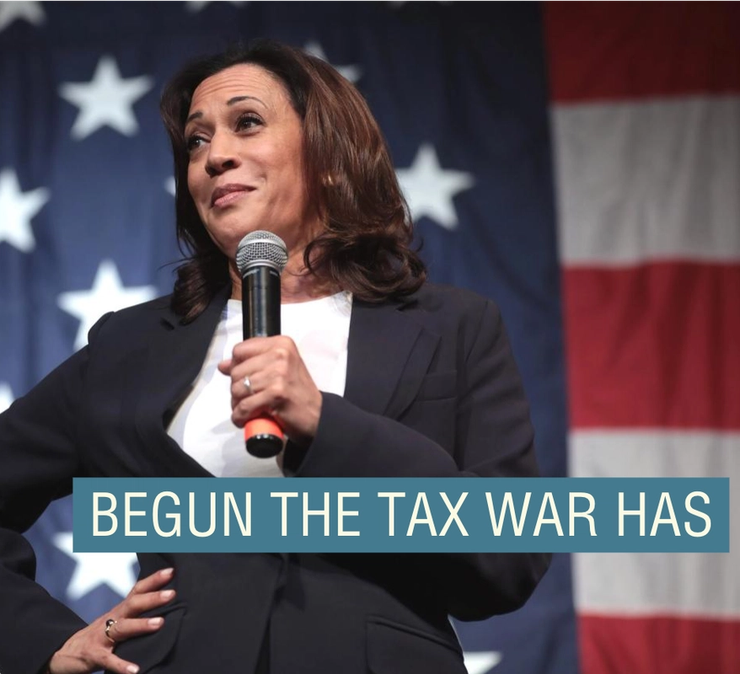The News
Donald Trump is weighing whether to endorse an expanded $5,000 child tax credit that would go to parents at all income levels, an official at his campaign told Semafor.
The former president’s interest in possibly boosting the credit comes after Vice President Kamala Harris unveiled a multi-trillion-dollar economic platform on Friday that includes a $6,000 child tax credit for parents raising newborns in their first year. Trump’s vice presidential nominee, Ohio GOP Sen. JD Vance, proposed a $5,000 child tax credit that would “apply to all American families” in a recent CBS News interview.
“President Trump will consider a significant expansion of the child tax credit that applies to American families,” a Trump campaign official told Semafor. “President Trump respects and listens to his running mate Senator Vance.”
Senate Republicans recently blocked a bipartisan tax package that would have modestly expanded the child tax credit and restored some expired business tax breaks, a vote that Vance skipped to campaign near the southern border. They also didn’t seek to extend a much larger child tax credit implemented in 2021 that President Biden had hoped to keep and that served as a model for the current Harris plan.
Despite that, and Trump’s still-uncertain endorsement of Vance’s idea, their campaign attacked Harris’ plussed-up child tax credit as an attempt to parrot the GOP ticket.
“No one should be fooled by the fake campaign copying President Trump’s vision,” Vance wrote on X, noting that Harris proposed eliminating taxes on tips after Trump called for a similar move.
In this article:
Know More
Harris’ economic platform also includes traditional Democratic priorities, such as restoring the enhanced child tax credit that briefly provided a monthly cash benefit to families regardless of income in 2021. The vice president also endorsed an extension of the Affordable Care Act’s insurance subsidies that made it cheaper for people to buy health care coverage in the law’s marketplaces.
“As president, I will be laser focused on creating opportunities for the middle class that advance their economic security, stability and dignity,” she said during a Friday appearance in North Carolina.
The Harris agenda offered an early look at her priorities, but so far her campaign has offered few details on how she’d propose to pay for her plans. An expansion of the Biden-era child tax credit alone costs $1.1 trillion over 10 years, and extending the ACA subsidies carries a price tag of $400 billion over 10 years, per the Committee for a Responsible Federal Budget.
Nor has Trump’s campaign filled in the gaps about how it would pay for a Vance-style expanded child tax credit if the former president gets on board with the idea, which could be especially challenging given that Trump has called for further reducing corporate tax rates along with a permanent extension of his prior tax cuts. These tensions played out during the 2017 tax debates, when Republicans struggled to pay for a more modest child tax credit bump without compromising on business-oriented cuts.
Vance himself alluded to challenges making good on his pitch, even as he offered it.
“You, of course, have to work with Congress to see how possible and viable that is,” Vance told CBS of his $5,000 child tax credit idea.
Harris’ economic plan also waded into more politically popular but economically risky territory by featuring a proposed ban on grocery price gouging. That idea met with particularly hard brickbats from the GOP and skepticism about its viability from Jason Furman, a past economic advisor to former President Barack Obama.
More than any other piece of the vice president’s economic platform, her child tax credit pitch underscores the battle to come on Capitol Hill next year over the expiring provisions of the Trump-era tax law that Republicans pushed through in 2017.
“I think this helps set the stage by showing that the Vice President’s priority as President will be continuing tax relief to low to middle income families,” David Kamin, an ex-economic aide to President Biden, told Semafor. “That’s a really different set of priorities than has so far been articulated by Donald Trump.”
Joseph’s view
Trump and Harris seem to be engaged in what Kyle Pomerleau of the American Enterprise Institute called a “CTC arms race.” It’s a remarkable back-and-forth over a long-running federal program that usually makes few headlines but could provide a sizable financial cushion to cash-strapped households and dent child poverty if implemented.
And if Trump’s campaign pursues the Vance pitch for a $5,000 credit, that could spark uncomfortable questions for the Ohioan’s fellow Senate Republicans about their votes against the bipartisan tax bill that cleared the House.
It wouldn’t be the first time Trump tried to nudge his party’s lawmakers toward embracing government giveaways that raised their ideological hackles; GOP senators balked at large stimulus payments that Trump pushed in late 2020.
There’s little reason to believe that Hill Republicans’ appetite for new benefits has grown since then.
Notable
- Economist Josh Barro isn’t keen on Harris’ proposed price gouging crackdown, but acknowledges that “to win elections, you run on popular ideas.”
- CBS News has the full transcript of the Vance interview that addresses his expanded child tax credit idea.


